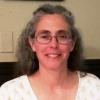Teresa Wheeler
Well that’s sort of the thing about the Catholic Worker in particular, the idea is that you’re working for peace and you’re doing the works of mercy at the same time. So the idea of hospitality, you’re opening up your home to people, and Peter Maurin who was one of the founders with Dorothy Day, that was his idea. We just had a clarification of thought, at the session last night at the Mustard Seed, that’s part of Peter Maurin’s idea that you’re serving and you’re also thinking about things and working on clarifying your thoughts. And you had the intellectual side of this movement and then the real direct service. The whole philosophy with Dorothy Day is that it’s a very personal movement, so you’re serving the individual, you’re really getting to know a person. And that’s what I really like about it because I really think that people can be moved much more easily and convincingly on helping people and just having an idea about a policy if they actually get to know someone or the facts. And so this idea of a Christ-room or something as a part of the Catholic Worker Movement and maybe you wouldn’t need so much government if everybody took on someone in their own home or that sort of philosophy.
Teresa Wheeler is a lifelong Worcester resident and peace activist. She has been involved in the Catholic Worker movement for over three decades and has done work in a number of social justice movements including offering extensive support for the city’s homeless population.










